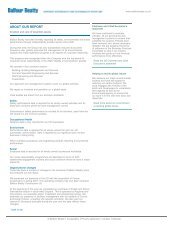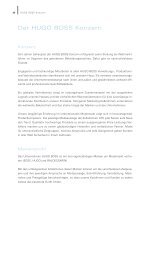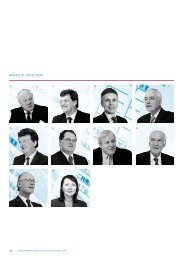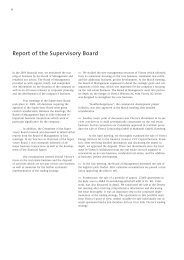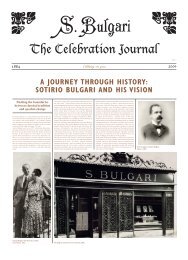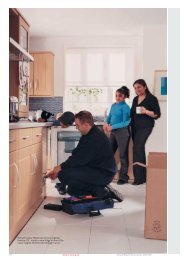E_mg_GB_03_vorne-29_3_04
E_mg_GB_03_vorne-29_3_04
E_mg_GB_03_vorne-29_3_04
You also want an ePaper? Increase the reach of your titles
YUMPU automatically turns print PDFs into web optimized ePapers that Google loves.
MANAGEMENT SHARE STRATEGY SPECIAL SECTION MANAGEMENT REPORT FINANCIAL STATEMENTS FURTHER INFORMATION<br />
Economic Environment • Situation of the Company • Organization and Structure • Risk Report • Employees • Performance of the Subgroups • Outlook<br />
Lurgi Lentjes: optimization of proprietary processes lowers costs<br />
As a specialist in environmentally friendly processes for thermal waste disposal, Lurgi Lentjes continued<br />
to optimize its processes for the incineration of waste. During this time, Lurgi Lentjes engineers<br />
gained valuable insights into the mechanism by which nitrogen oxides are formed. These findings<br />
are now being translated to an industrial scale. The company believes this will considerably reduce<br />
the cost of running waste disposal plants. Once it has successfully optimized its proprietary processes,<br />
Lurgi Lentjes will be able to offer a simplified, more compact form of flue-gas desulfurization plants<br />
that will generate further cost savings in this product area.<br />
Zimmer: cutting the cost of producing PET bottles<br />
Zimmer is currently developing a new process for manufacturing PET bottles, a rapidly growing market.<br />
This process facilitates the direct production of bottle preforms from the PET polymer without the<br />
need to produce granules. Because this process has fewer stages and does not involve transporting<br />
intermediates to the processing agent, it reduces production costs by around ten percent.<br />
Dynamit Nobel: successful development projects in all businesses<br />
Chemetall’s specialty chemicals business developed and brought to market its Cerate process, an<br />
environmentally friendly way of protecting aluminum surfaces against corrosion. In the past,<br />
such surfaces have been protected against corrosion using highly-toxic chromic acid. Chemetall’s<br />
chrome-free process protects aluminum against environmental influences and optimizes the paint's<br />
adhesiveness.<br />
Dynamit Nobel’s plastics business focused on developing its so-called hybrid technology, which is<br />
used in the automotive industry. This process uses plastic-metal compounds as stabilizers in the<br />
front section of cars. This mix of materials is much lighter than conventional stabilizing elements<br />
made of metal. The hybrid construction reduces the vehicle’s weight and fuel consumption.<br />
In the growth area of nanotechnology, researchers at Sachtleben Chemie have developed a new<br />
generation of nano-particles for a new field of application: nano-fine pigments made of titanium<br />
dioxide make it possible to produce self-cleaning, dirt-repellent surfaces. They are used, for example,<br />
on house walls, roof tiles and paving stones. Experiments have shown that as dirt does not stick<br />
to surfaces coated with titanium-dioxide pigments, it is easy to rinse it off with water. The nanoparticles<br />
are either added to high-quality paints and varnishes or applied directly to the surface as<br />
a solution.<br />
As part of a development project funded by the European Union, Dynamit Nobel’s advanced-ceramics<br />
business is working on the development of a ceramic material for use in medical equipment.<br />
57



